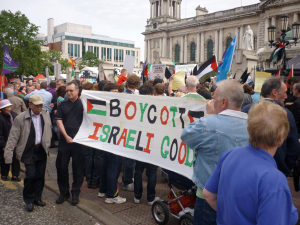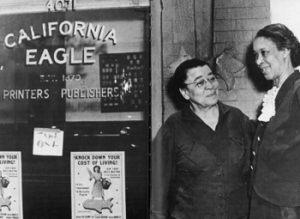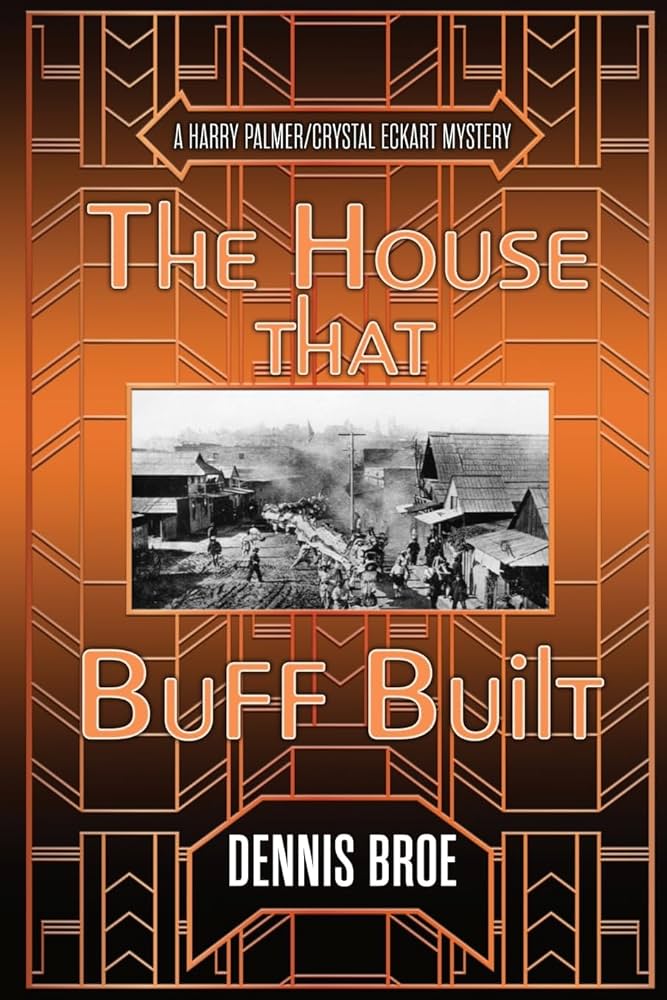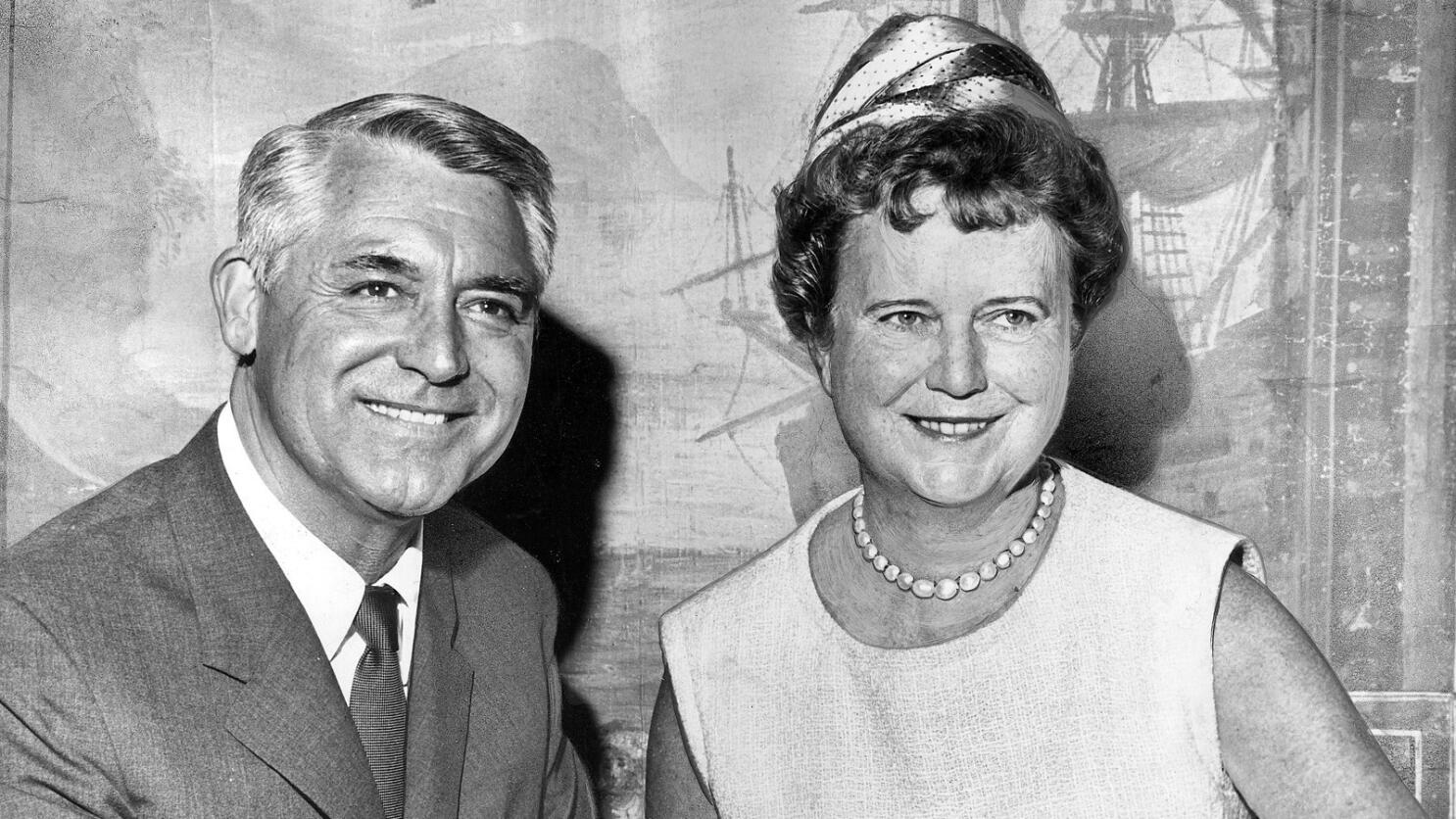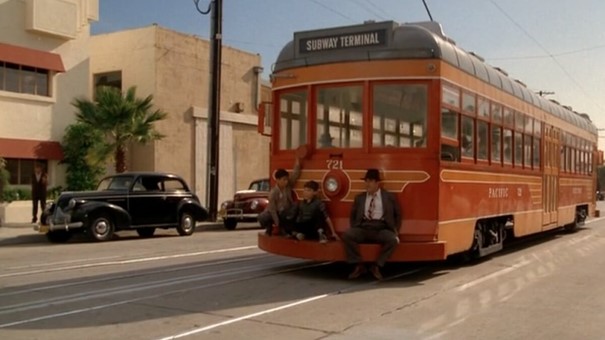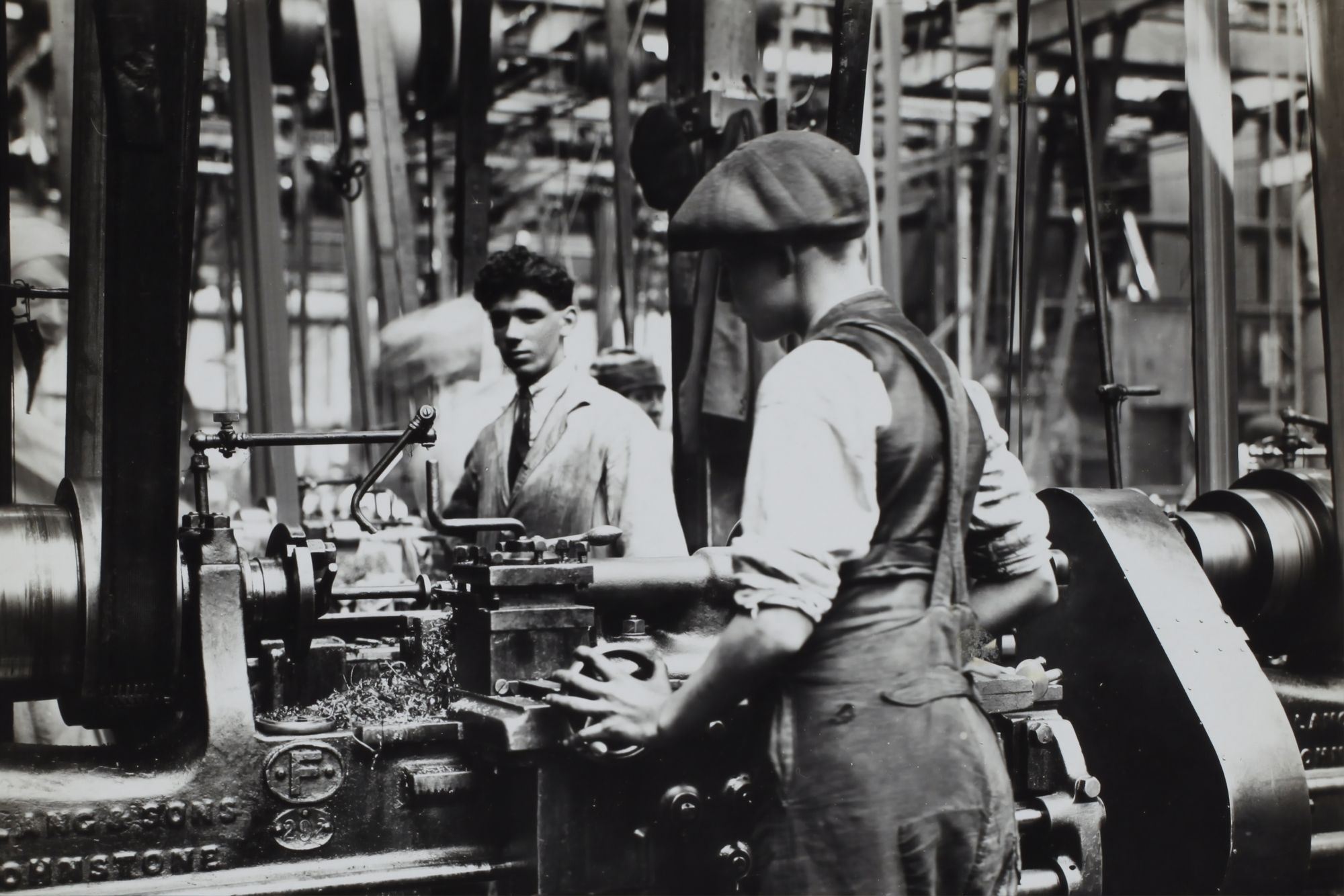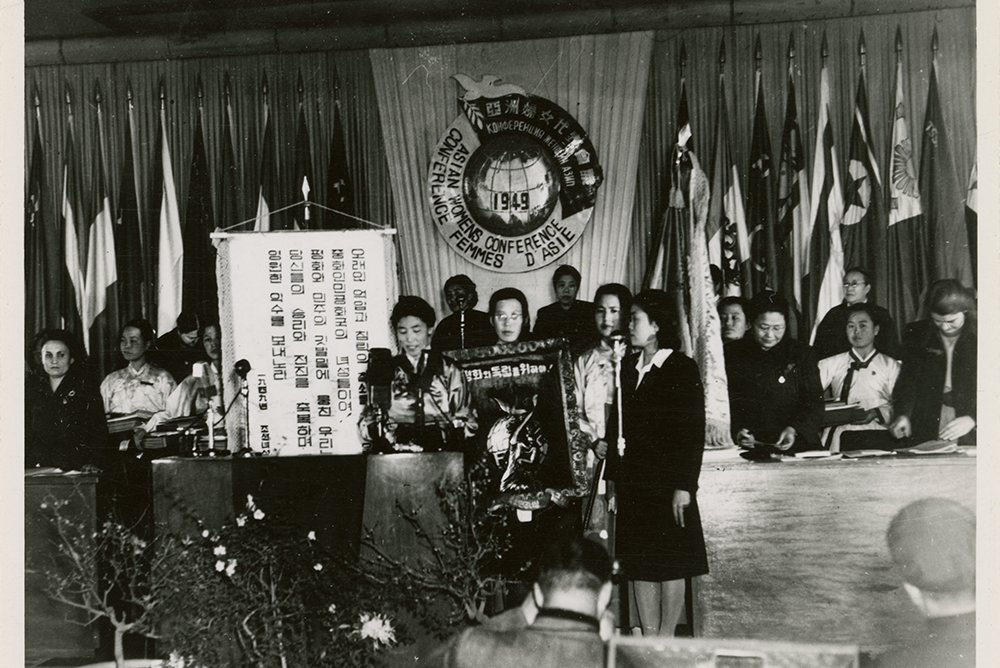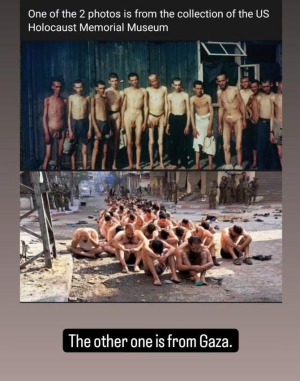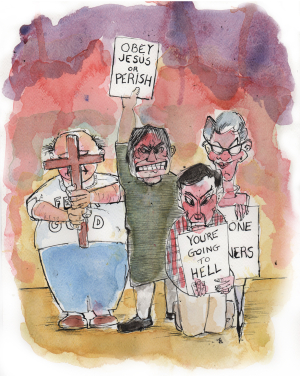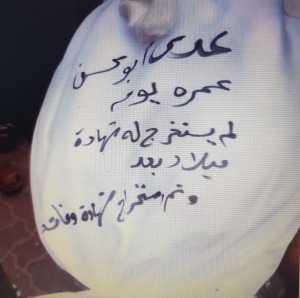'A House in Jerusalem': Interview with the director, Muayad Alayan
Brett Gregory interviews Palestinian screenwriter/director, Muayad Alayan, in Jerusalem about his latest film.
BG: So where are you right now?
MA: I'm in Jerusalem.
BG: So obviously people in the UK would like to know what's civilian life like in Jerusalem at the moment? What's the atmosphere like? Because we're just getting mainstream news here a lot of the time.
MA: Of course. Jerusalem has always been tense, Jerusalem has always been a place where you're always on edge, you're always … like something could go wrong any minute any second anywhere. You know I think we have been living in the last few months some of the most tense and stressful, you know, circumstances that I've ever experienced myself as a Jerusalemite and as somebody who grew up here. I think it has been, yeah, some of the most tense. The divide in the city across the eastern side which is dominantly Palestinian and the western side which is dominantly Israeli has never been as, you know, as segregated let's say.
BG: Right, and so what's your view of the future or the near future or the far future?
MA: I mean honestly the situation in Jerusalem and the West Bank for us Palestinians is horrible but we don't dare even complain or even you know talk about it, even though there's hundreds of people who have been killed in the last eight months. Thousands of people have been arrested because of what we're seeing in Gaza and what we witnessing in Gaza. So we cannot we're like … we don't dare complain, you know, because of the massacres we’re witnessing, so we are kind of just praying for an end to all of this.
BG: So I mean it's off topic … are you personally at risk as a filmmaker in terms of … because obviously you communicate to the wider world outside of the region, and obviously from different … forces that would consider to be I don't know whatever … So I don't know are you or are you just considered as another civilian?
MA: I mean since the beginning of the war there has been a lot of arrests among artists, intellectuals, creatives … Even not only for Palestinians who live inside Israel, also for Israelis who are on the kind of left-wing, progressive side you know? There has been a lot of arrests for people who have just denounced the killings that are happening in Gaza or just expressed their opinions or social media or something. There has been house arrests and physical arrests and several other things, so it's yeah it's … Everybody's careful, let's say. It's becoming like a Big Brother kind of police rule you know?
BG: Well, that's never reported on in terms of Israeli resistance to Israeli aggression I suppose …
MA: Yeah, there was a demonstration yesterday in Jerusalem a small one, of course, because the left in Israel shrank significantly over the last 20 years, right, but they were crushed, they were arrested and they were dragged and, you know … Yeah, there was a demonstration by Israeli leftists in Jerusalem demanding an end to the genocide in Gaza, and they were crushed and dragged into police cars.
BG: Right, okay, well that's set the scene. So moving on to the film: in what ways does your latest film ‘A House in Jerusalem’ have semi-autobiographical origins?
MA: I mean it is the most personal story of … The most personal film I've made so far. It's not a one-to-one true events kind of, you know, inspired by our house but it is definitely a story that is inspired by the trauma and the survival of my parents and my grandmother who all became refugees and were forced out of their homes and their territory and their land in 1948 during the Nakba when Israel was established, and they were never allowed to go back to their homes: the Israeli law just simply did not allow it, although they were among the very few lucky Palestinians who became refugees within historic Palestine and did not become refugees in Jordan, Lebanon, Syria or what have you.
So it is inspired by their stories, it is inspired by their survival and how they coped with this trauma you know? The seeds go back to our childhood and the oral history and all the stories that they used to narrate. My father used to deliver meat on his bike from my grandfather's butcher store which was in West Jerusalem before 1948, and he basically knew all these neighbourhoods so well, and when we were growing up he used to drive us through these neighbourhoods on our way to school, and he would narrate stories about these neighbourhoods that look completely different today, you know? To him he used to see these ancient Palestinians houses, institutions, football clubs, and to us what we saw as the young generation it was the new McDonalds and Starbucks like cafes and this other kind westernised reality that Israel has established in these neighbourhoods, you know?
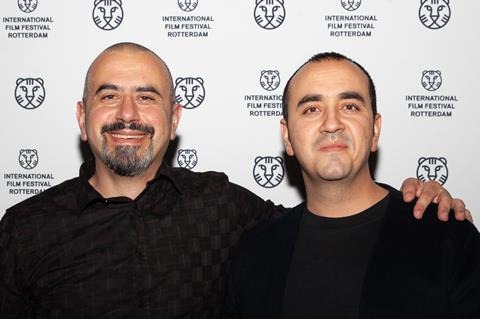
Muayad with his brother Rami
So to me and to my brother Rami, who co-wrote this with me, we with my father's story, my grandmother's story and my mother's stories, you know, we felt that they were living with a part of them stuck in the past, stuck in these times and in these places, and this is what drove us to kind of come up with the concept of the ghost of the living as opposed to the ghost of the dead, you know? Because we believe that they were living with these ghosts of themselves, stuck in time, in these traumas that they went through.
BG: Yeah, I was thinking actually about do you relate the idea of memory to the notion of haunting? You know, are we haunted, is that are our memories are our ghosts, and also when they say like an older generation walking down a street and in their memories they see a different street but that because they're present that memory is present and the past is now, do you see what I mean?
MA: I think it is a presence that is so powerful that you could touch it even, you know what I mean? It is that powerful on your soul and in your spirit and, unfortunately, a lot of us go through our lives unaware of these ghosts that we've left behind with people that we love or traumas that we went through places that we are attached to, you know?
BG: As a Palestinian director why did you decide to frame the narrative from the perspective of a Jewish settler or the settlers like the father and the daughter?
MA: I chose to narrate the story from the perspective of a child, you know? It just so happens that these houses in West Jerusalem that used to be Palestinian houses are in the particular neighbours that I'm talking about that I my family used to live in and the neighbours that I know so well, most of the immigrants who live in these places are Jewish families who recently moved from the US, the UK ,France or other parts and they like the neighbourhoods, they kind of appreciate the nice architecture of the old Arab house architectures, and the nice greenery around the houses you know? Basically, if you go to any cafe around these neighbourhoods you'll hear all kinds of languages: you know, French, British American and British accents of English, and you know you will hear so many people who come there and who have either recently moved there or their ancestors moved and then they joined them and made Aliyah or whatever.

Miley Locke with Johnny Harris
So to me I wanted to make a story about a young girl a child who does this move, who's forced to do this move, and she experiences this place first-hand, she has what she's being told, you know, and there is what she's finding out and what I wanted to do is … I was hoping that the innocence of children both of them, the both lead actors, the both lead characters, the innocence of children gives us the room to raise questions in the face of the adult world that we usually adults don't dare ask, and don't dare confront among ourselves even within the same kind of group, you know what I mean? And I think that the innocence of the children gives them this courage to put a mirror in the face of us the adults with all the corruption of, you know, the politics and all the, you know, ideological baggage that we carry around, children just don't have that, they are not corrupted yet so they can they dare ask the questions, that's what I wanted to do.
BG: Yeah, that was successful in that way. I mean I might be wrong on this but when I was watching the film are there references to the dybbuk from Jewish mythology. You know the doll and the dolls because I was reading up about this and like because the father accused her of like, you know, she like sort of needs therapy, she's not well and that and the dybbuk in Jewish mythology is rumoured to be associated with female hysteria and I'm they going this belief in the doll as a connection to the past …
MA: I have to admit I had no idea. It was purely these dolls were very common in pre-1948 Palestine still. I mean more and more they're vanishing, but these handmade dolls were things that mothers and their daughters used to make, they used to make them for their daughters and then the daughters would learn a little bit of embroidery and that they would do Palestinian embroidery for their dolls …
BG: So it’s a female cultural practice then?
MA: It is. During the research I looked at so many images from an archive; it's also on Facebook: it's called British Mandate Jerusalemites Photo Library. And if you go to that resource you will find so many pictures of families, Palestinian families from West Jerusalem pre-1948 and in the majority of these pictures you will see that the girls made sure that they take their dolls with them to whatever studio or wherever they were taking the family pictures; this depending if it was on Christmas or Easter or whatever it was they made sure they took their dolls with them. So during the research for the film this was where that came from, that's kind of element of the girls from that era.
BG: Right, yeah, well there is this thing obviously about cultural objects that we own and possess. I mean, because I used to be a lecturer and so with stones you find on the beach and you pick up the stone and walk with the stone, but by the end of the walk the stone is warm and it's your stone it's not just a stone it's your stone. And that's the things with the dolls and the fact is it owned by the Palestinian girl and then it's got human qualities have been invested in it and that's what's communicate that's and obviously that's either a positive or a negative dependent on the person in receipt of the thing.
Anyway, moving on: I'm going to be a bit geeky now in terms of film references in the film so this is what I noticed and I don't know how conscious you were these creative decisions. So previous horror stories and ghost stories and films such as ‘The Exorcist’ I don't know was that in your mind. Not at all? Like the concept of a young girl sort of transitioning sort of thing and then these … Right, okay, I mean a lot of these 70s films I don't know about it's like ‘The Omen’ I had in there and it's about like child possession these film cycles went around in the 70s but then also ‘Don't Look Now’ the British film it was set in Venice there was I'm sure ‘The Sixth Sense’…
MA: I drop ‘Let The Right One In’ and I can explain why … I we never wanted to make a horror film. it was never a horror film for us but we definitely realised there were horror elements in there that we also wanted to capitalize on and we we're aware that there's this room for this use and this cross over to the genre elements in there you know? What I liked about ‘Let The Right One In’ is that you know you start off with this fear of the unknown you know of the vampires and what they could do and then you end with how evil the average people could be, you know, and the evil that is in the everyday man and child and whatever that for sure was something that I can admit was an inspiration to me, you know? What I mean that concept and ‘Let The Right One In’.
BG: Yeah, right, well I mean it wasn't really a horror film there was I mean the thing is there's some kind of peace in terms of narratives with children and ghosts. For instance, I mean there's a film from 1972 called ‘The Amazing Mr Blunden’ by Lionel Jeffries which is about Victorian children haunting 1970s children and there's a connection and I was watching – you need to watch this film – and then you'll see it and you'll go oh there are similarities but of trying to connect and what they're trying to do is save the ghosts from dying. They die in a fire but they want to go back in time to save these children. It got remade just about 5/10 years ago but the original from the 1970s Lionel Jeffries is the director who was a famous British actor.
But like I did get those vibes and I was watching it's that sense of … it's an opportunity for children to be heroes outside of an adult world, and I think that's the same with your film you know, to actually have agency and autonomy and make decisions and then we can see and we're encouraged when watching the film to perceive the child's point of view and not the father who's meant to be an authority figure and sensible and you know using medical support. And then we see that this is all disconnected from being human, you know, it's that like she you know that that the people's experiences are just as valid. Anyway related to the father which I'm personally interested in, here in the UK many of us vividly remember Johnny Harris' performance in Paul Andrew Williams’ ‘London to Brighton’ from 2006. So have you seen that film? I mean he's excellent at merging and communicating masculinity with vulnerability. I mean … you can see he's got very good eyes for that very sadness.
MA: He does the broken man, it is very scary. You know it was amazing. I mean the process with Johnny was like I learned a lot from Johnny honestly and I really think that not only in portraying Michael and really bringing this ability to portray the complexity of the loving father, the broken man and the will to move on, you know, this kind of anger and will to move on just like find a shortcut and move on you know that was causing him this frustration, and his belief that this could be the solution for both of us, you know, why don't you just accept. And, you know, this conflict he really brought amazing things to the screen for me and at the same time because of the nature of the story and the sensitivity of the trauma and, you know, the grief working around children is not easy and that was another thing with Johnny because he was so sensitive and so careful as well, no matter how heavy these scenes were you know emotionally for him and for Miley he was really very sensitive and very supportive and that was that was a blessing honestly.

BG: Yeah, I'm a filmmaker I've worked with children as well, and yeah adults can get a bit twitchy like something's gonna go wrong but actually the children are all right. They're all like ‘What are you about? Let's get on with it.’ So ‘A House in Jerusalem’ was shot on location. What was this experience like? I'm thinking of the checkpoint actually and this idea of surveillance, and also the plot point with the police just being allowed to confiscate the phone and just the scan it and stuff, and I'm there going ‘All right this is like a police state’, that you know that's what the feeling, you know, from my British perspective so what was the experience like? I mean obviously you filmed there before …
MA: Yeah, that's so many questions in one but I'll try give it my best. No worries. Filming on location here is always challenging, it's always a nightmare seriously, especially for a Palestinian production or a Palestinian co-production. No matter if you're a UK or a European co-production so usually that really affects how the design of the production, its shape and it affects so many things. I'll give a few example so we shot in Jerusalem east and west and we shot in Bethlehem inside the camp and near the checkpoint, the main checkpoint that leads to Bethlehem right for the Bethlehem part I can tell you the interior is not the real interior of the checkpoint, of course, … there was no chance they would give us permission to film there. We filmed outside and the inside was a garage that was turned into the interior by of a checkpoint by our production design team which you know as a Palestinian production design team checkpoint is something you're forced to unfortunately go through a lot but also build a lot for films so we had to build that on the inside of Aida Camp, was real Aida Camp.
We filmed in the camp with the help of so many artists and friends and filmmakers from the camp. It's a condensed camp, it's one of three refugee camps in Bethlehem that is packed with people and it's a ghetto and we were so lucky and we were welcomed by the people there the minute they know it's a Palestinian film, a co-production, it's a story you know they people open in their houses and their hearts. On the Jerusalem side we had to come up with a plan that basically on one hand we struggled to find a house in West Jerusalem that first the Israeli owners would give us to use, you know, given this is a Palestinian film, you know, all right the other thing is most of these houses these old Palestinian houses in West Jerusalem that are now inhabited by Israelis, they no longer have this massive house structure with a garden outside, they all were turned into duplexes and apartments and the gardens were unfortunately butchered by new villas and what have you, so our only choice was to try to locate similar houses from the same era on the eastern side of the city so the Palestinian part of town and we found two houses and we really had to beg the owners of these houses to let us film there and it was COVID so people were extra kind of sensitive and careful around people coming anywhere around them or into their house. But we really had no choice: it was one of these two houses that really resembled the houses from this era and finally we succeeded in getting this house that is 120+ years old and we had to film the house and the garden in the eastern part of the city.
The minute we step outside we're in the western part of the city so we filmed in the relocations in West Jerusalem outside and inside the house and the garden we in East Jerusalem. And because of this sensitivity of, you know, how do you film in West Jerusalem, you know, on a Palestinian film set and we had to super-micro, we had to look like a documentary crew almost on the western part of the town, we had to scatter, we could not block streets, we could not block any pavements, we had to scatter our base into, you know, part in a nearby hotel and another part, you know, in a restaurant and some of the group the catering in a park nearby. And you know there was only around eight or ten people at each given time where we were filming in the streets and the neighbourhood in West Jerusalem.
Yeah, so that was that and then added to all this mess because of COVID we had to deal with different kinds of, at the time, this feels like ages ago but it was just like a couple years ago where we had to deal with different regulations based on what the UK and the EU had, the Palestinian territories and Israel on their lists, you know, some moment it was amber and other moments it was green, and then we would have to move company because the last 10 days of your production you need to be in a green country otherwise you will have to quarantine the way back up. So that COVID bit was a nightmare that usually when you talk about producing a Palestinian film, you know, we talk about the roadblocks, the checkpoints, the harassment, the occupation but with COVID that was an added layer of kind of complexity.
BG: We were shooting my sort of debut feature in Manchester in northern England during COVID and the whole city was shut down, and then so – I mean have you seen like ‘28 Days Later’? You know, the zombie Danny Boyle film and they shot at London, you know, desolate sort like 5a.m. or something so when no everyone was in bed. But when we were shooting to obviously say about the end of the century or beginning of this century it's all dark, the city was completely empty and all the lights were off in terms of all the office blocks yeah … and there was no police, there was no there was there was some homeless people but we got we actually had the whole city as a set and we just wandered around and filmed what we wanted and there's no one there ruining the shots. I know it’s never going to happen again, we got a lot of yeah I know we got lots of actors because they were just sitting at … for free because they were just sitting at home doing nothing. A weird period when like contacted these actors again to about doing another projects and go ‘No, no, no. We're busy now. Anyway, moving on so how is the current context of war in Gaza affected ‘A House in Jerusalem’ and its ongoing promotion?
MA: I never imagined that this film will be made or released during any kind of time where the story of displacement of Palestinians is this relevant, you know? In our worst nightmares did we ever think that, but I think it's sadly more relevant than ever, you know? I mean, yeah, what's happening in Gaza makes what's what happened in 1948 sound like in terms of numbers at least, you know, it's unbelievable. And I think like you said I can say that we definitely being a Palestinian co-production being a Palestinian film during such times you immediately get some sensitivities of you know is this another Palestinian film you know is this another propaganda film or whatever, and then you at the same time you gain a lot of interest from a lot of people who are really curious and want to know what's going on there, and what's the history of this whole thing.
I mean technically this is a fact: 70% of the population of Gaza are refugees, I don't know if you knew that? Yeah, so 70% of the people in Gaza are registered refugees recognized by the United Nations as refugees who were expelled from their homes and their houses and their territories and their lands just like the house in Jerusalem, and they were pushed away into refugee camps in Gaza and basically Gaza which was at the time in 1948 I think not official numbers … I think Gaza had 200,000 population and then 300,000 refugees went to Gaza and this half million population grew into this 2.2 million population so Gaza is dominantly refugees.
So it is the story of a house in Jerusalem is very relevant but sadly these refugees are now being made refugees for the second and third and they're being tossed around and moved around you know. It's like they're being asked to go to the sea or to the beach and then they start new tents near the border and then they bump them and they ask them to go back to the centre and this collective trauma of us, the Palestinians, does not seem to ever be ending. And I think it like yeah to me I'm just so happy that the film is being released. I'm so happy that the film is being shown because I really hope that people would walk out from the screenings with, you know, feeling and a couple of questions about this whole thing, you know, and to take things beyond, you know, even for those who were tracking the news in the last seven months you know people need to see the bigger picture. I think people need to see.
BG: Yeah, yeah, I think it's good with in terms of to me like young adults which I used to teach you know like in their late teens/early 20s and it's sort of a good counterpoint because on the mainstream news, and particularly on social media, it's just layers of horror and horror and, you know, its runs a risk of you know sort of making them inured, sort of dampening their emotions because they just overwhelmed and say this is something that's impossible to tackle but that said this generation of young adults, particularly the universities, there's a lot of protests, you know, in the UK universities and obviously in the US and obviously in different states where some of them are bringing in riot police and then others are having negotiations.
So the thing is there is some sort of I believe which is completely different to say to the conflict in between Russia and Ukraine where there seems to be a passion and a connection with the Palestinian situation and history and the thing is like and obviously because of my age in the 90s when I was at university the concept of Zionism was pretty simple. I'm saying ‘Oh well, this is this is sort of like, you know, this compressed sort of Israeli ideology, you know, this aggressive and also they've got access to nuclear weapons and military stuff and obviously they're bullying the Palestinian people. This is when we were like, you know, I was a teenager, you know what I mean, and this was normal but then some propaganda machine has kicked in during the expansion of the internet around 2000 of this equating Zionism with anti-Semitism. Where did that come from?
MA: That was strategic … it was in the open. Like there was I remember reading about it in Israeli media and it was a plan to do that, to counter what was going on with the younger generation that is being becoming more and more aware about the occupation and what's going on in Palestine and they tried, and they are still trying to play this card to equate anti-Zionism with anti-Semitism and this is complete nonsense, you know, it's complete nonsense.
BG: Orwellian. It's an Orwellian sort of collapse of language to create thought, but what the worrying thing is there's obviously because I was born in the 70s so I've got a different historical perspective than those say born at the end of the 90s or the beginning of 2000s. That have not experienced anything different and they go, ‘Oh well is this the cultural reality and you go ‘no’.’ Anyway, so ‘A House in Jerusalem’ is on release in the UK from Friday 31st of May. Now if you were to write and shoot this film now in 2024, in what ways would it be different? For example, would there be more anger, accusation, demand for justice in the film? Would it be more obviously with what's happened, you know, like how would you have approached this film with what you know now and what the world knows?
MA: Now, honestly I see your question, I see your point, I see where I see the idea behind the question, but honestly to me this film and this story is very personal. I am the son of a mother and a father who are both refugees who were expelled from their homes and they lived their lives longing for that place and that time and in both of my family from both sides they've lost family members in 1948 and in 1967, and they've lost family members and right now when I'm talking to you if I point one kilometre that way out of the window is my family house. I have no right to ask for it under any part of this, it's there I cannot demand it, I cannot claim, it even if I have the legal in Israel it that I don't exist, you know. So I for this film I wouldn't do anything differently. I would still tell the story of these two girls who are hurt, broken and they found a way to heal together and who raise big questions about personal trauma and collective trauma as well.
Unfortunately, hundreds of thousands of Palestinians now are facing the same kind of reality from back in 1948 again now in Gaza, so there is a connection for sure but I wouldn't have done this film differently I would have just narrated my story because I'm pretty sure there will be so many Palestinian filmmakers from Gaza who will tell their stories of trauma and of grief as well. I mean, if I go into the details of certain things in the film there are so many things like that, for example, I'll give you a very quick example so that boy with the bicycle when Rebecca is walking in that street that's called ‘The Valley of the Ghosts’ right now in Hebrew, it's called ‘Valley of the Ghosts’ I read that, yeah, so that that store was my grandfather's store right, and that lady with the hat that she sees coming out – that mysterious lady, ambiguous lady that comes out of those two villas – this lady this actress, these are actually her uncle's houses that she cannot go back to, you know.
The place where Rebecca has her nightmare and she chases her mother that's the destroyed village of Lifta who hundreds of people were expelled from and became refugees, you know, where you see the cactus trees and where she runs between these ruins, yeah, and where she encounters the wells in this country and this part of the world, these wells where she goes on the tour with the kids in the summer camp. That's the village of Imwas. Imwas is a village that was destroyed in 1967 not even in 48 in 1967; they destroyed this village and expelled all the population to Ramallah because they wanted a clean highway between Tel Aviv and Jerusalem; they didn't want Arab towns on the way, right, so there's that village so Simon the dog that Rasha is talking about in that scene, my grandmother's dog was Simon, and when she came from her house to the family house she ran away during the war during the war she went back to check on her house and she found her house was bombed and Simon was shot. It is a very personal film to me, it's extremely personal everything in the film, in the mosaic of the film is so personal and I wouldn't have done anything differently. But I can tell you that there will be many other stories maybe from other filmmakers from Gaza that unfortunately talk about displacement and grief and trauma and our ghosts that, you know?
BG: So as a Palestinian filmmaker/artist, let's say, are you compelled to create stories about the region, the people, its history and its future? Is this your duty as an artist? Do you feel this is this your destiny do you feel?
MA: I decided to be a filmmaker because I wanted to tell stories and because I wanted to touch people's hearts and challenge people's minds, and part of that goal is coming from the fact that I'm Palestinian and I come from this heritage particularly with the fact that historically we have been crushed in mainstream media and our narrative has been, you know, censored, blocked, you name it. We grew up with this feeling that we know we're aware that the powerful media in the world is against us and the media in the world does not allow us to, you know, narrate.
So becoming a filmmaker partly was due to that the like very early days and, yeah, I mean, I think we have something to say, I mean, in the beginnings, you know, we all go through this naive period where you think if I narrate what's going on, if I tell our perspective to the world, the world is going to change, and this suffering is going to end, then you realise that the world doesn't work this way, you know. You sometimes think that you just need people to know, you know, and then some but actually the problem is not just knowing, you know, there are powers there, there are so many things that are capitalized in this world to keep us in this situation.
BG: Yeah, exactly. I mean the thing is what changes – I mean this is me being hopeful – is you don't change the world, you change your perception of the world so your process of making this film has changed the world as you see it, you're a different man.
MA: Absolutely. And I know as well that in every screening, in every Q&A, I can see, of course, I see people who walked in, you know, who are fans and followers of art house cinema, and because of that they have watched so many Palestinian films and they have been exposed to Palestinian cinema but I also see people who have never seen a Palestinian film before and they are, you know, encountering this narrative for the first time and I feel blessed and I feel that it means something, you know? What I mean, yeah, and I see people who walk out you know in tears out of the screenings and I'm sad sorry but I feel happy that it works and you know they're going back home with this kind of fireworks of emotions that I'm sure they will tell their friends, their grandkids, so that's what kind of drives me right now, you know?
BG: Do you see yourself then as a film director or a Palestinian film director? Because I, for example, I'm from a working-class background, poor background and I pursued academia and that is how I ended up making films, you know? It's just through education not money, no connections but because of that then I'm associated with the social realism genre and like working-class, everyday people and saying, ‘Oh well, because that's your background that's the films you're meant to make,’ and I'm there going ‘No’. So now I'm in production on a short adaptation of a Franz Kafka short film, as far away from working classness as possible to prove that I can work in different genres and I'm not imprisoned by my background my, you know, and that's the same question I'm asking you: do you feel that you're tied? I mean, it might be a good thing that you're tied I mean like Scorsese says he's very happy about his Italian-American heritage and doing the films over and over again about that, but there's others that go, ‘Well, I don't want to be doomed by my or trapped by my ethnicity or my economic social status. I want to be creative and expressive so there you go.
MA: It's a very good question. I'm often asked this question in variations of, you know, approaches but I like how you, I mean, I'll try to make it short. But so on one hand in the recent years apart from ‘A House in Jerusalem’ most of my films have focused on Palestinian anti-heroes particularly in Jerusalem who are confronted with situations that are bigger than themselves and that they are not heroes or they were not built to handle, yet they have to figure out a way how to handle them. I in … like the stories that attract me and that get me writing notes on the side for the day when I'm going to write a treatment and a script about, it's the average anti-hero, who's a hero to me in other ways than the expected on the average, you know, the heroes of just simply being able to survive or provide for your family. I'm biased towards these people who do not make it of to the news, you know?
BG: Underdogs. The underdogs.
MA: Yeah, so a house in Jerusalem is an exception in that fact because it was a personal film, it's a personal project and it's something I wanted to make and, yeah. So do I see myself as only making … There was a saying I can't remember who said it but it's basically ‘if you want me to write poetry about the birds you need to turn off the fighter jets and the tanks so I can hear them’, you know what I mean? And this is my answer also about cinema. I cannot remember, I think it was a Palestinian poet who said that now – I've had fever for three days so yeah I'll dig the name if you want – but I think I always like that quote because it was so true. In our case even if we make like a two character story locked in a house, you know, like a one location story. The occupation will be right there out of the window, you know, there's no way you can it is the thing that has left the biggest mark on our lives and we would be, you know …
BG: Blind to ignore.
MA: You know, yeah so it's it does not make … I wish we can make cinema without having to deal with this but if we try to do that right now it's … I don't know what kind of mutant.
BG: I know it reminds me of, you know, Jan Švankmajer, the Czech sort of animator like clay and he was working under, you know, communism in the 70s and all his films were interpreted as anti-communist even when it wasn't. Oh, this is obviously about being the claustrophobia, you know, and then I the world events in that context end up defining your individual creativity even if you're not engaged directly with it and then I'm just interested about that because then the idea of creativity that is associated with freedom but then is there any freedom because then you say, ‘Well, I'm going to be because … I'm Palestinian I'm going to be interpreted in this way at this time in history’, and then, you know, so if you went and did a like a rom-com musical in Chicago and then people will go, ‘Yeah, but what's the Palestinian angle?’
MA: Absolutely, absolutely. And, you know, it get to some point where sometimes I mean … Even in some of my previous films, you know, certain audiences around the world, unfortunately, they are okay let me be careful with this answer … I think there has been a lot of films that have been made with that are good films important films but the main aim was to counter the Israeli propaganda in Western media … and I think that's important, I think that's crucial, I think we need to do that because Western media is biased period.
So we need to counter that with art, with documentaries, with social media, with every tool we have. But not every film, I think, has to have that kind of one kind of solid goal. I think we should have Palestinian love stories, horror stories, detective stories, Westerns, I don't know, we need to have Palestinian culture and literature on all platforms possible around the world because as much as it is important to counter the propaganda narrative of the Israeli occupation, I think it's more important to prove, I mean, we don't need to prove to the world but we need to show it, we need to make sure it's there that we are much more than a nation under occupation. Not simply, you know? So that's why sometimes there are certain expectations of a Palestinian film – ‘Oh, where are the checkpoints?’ – you know it doesn't fall into that kind of activist category, you know what I mean?
BG: Well, yeah, but also it's the sort of dominant narratives that then will … the dominant forces are setting the narrative and then you've got a Palestinian narrative that's a reactionary narrative so that means the dominant force is already then controlling the cultural dialogue so then the Palestinian filmmakers in this case are then drawn into an argument and making films to say, well, I want … I wanted to do a science fiction film but I can't. Now I've got to do, you know, a sort of political film, do you know again sort of thing? So, yeah, I know, I understand, I mean it's just the demands of the wider world or demands of the audience or those in in the industry and it's just fascinating about how things are sort of, yeah, interpreted. It's like that's what I'm saying about with you say like that's the question about the semi-autobiographical angle where people won't see that because it's a female girl who's the lead and it's the ghost girl, and where do you come in who's playing your role, do you know what I mean? As a witness I think it's a witness to the … I see your character in the old lady, I think.
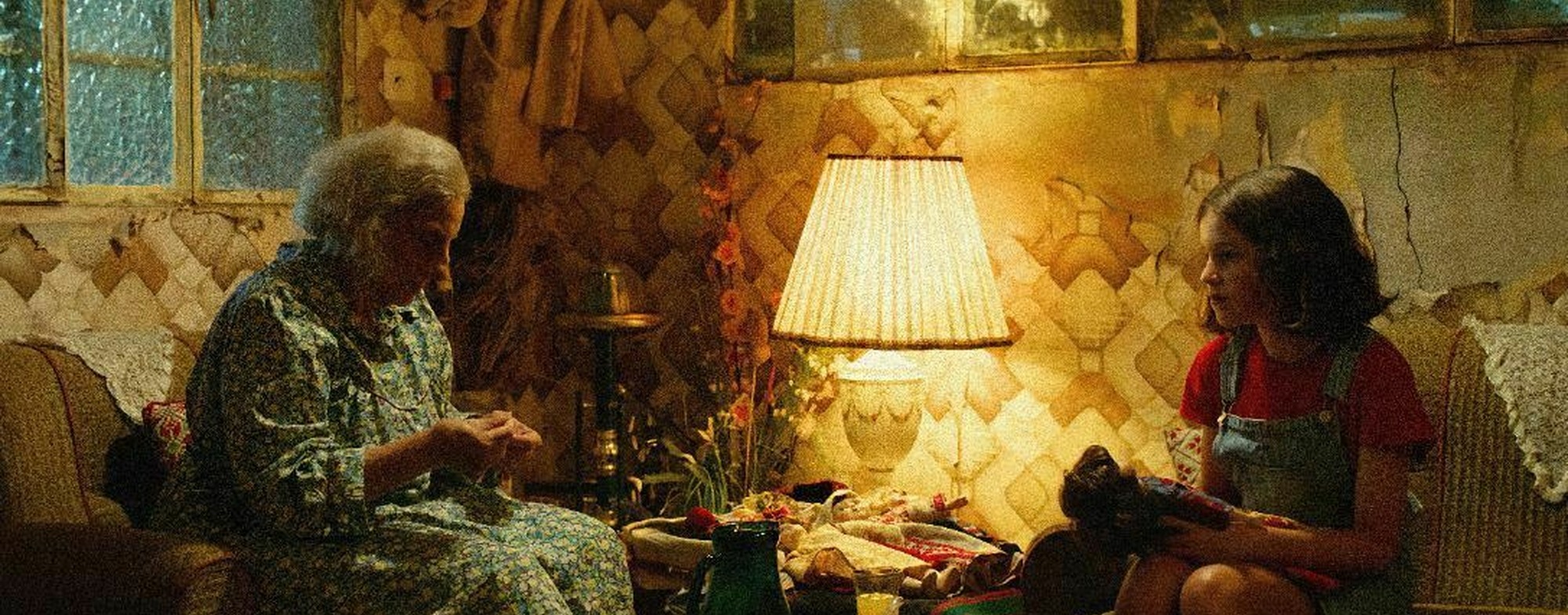
Miley Locke with Souad Faress
MA: You know I think the old lady is my grandma, but I'll tell you a story, it also goes back to your previous question of Palestinian filmmaker or filmmaker that's Palestinian, and I think being Palestinian is what led me to this path because I have two memories of how I became a filmmaker. There is one when I was a teenager and digital technology was on the rise and we got our hands onto digital cameras and editing software and we thought okay this is our time to tell our stories to the world and, you know, film documentaries about the occupation and what they're doing to us, and you would walk down the old city in Jerusalem and the minute they see you with a camera the first thing people would tell you. ‘Show them. Show them film. Show them.’ This is the first word you will hear around from everybody in the streets, the sellers, the passers-by, show them the world, you know?
So this is one experience as a teenager, the other experience as a child was when we bought the very first video camera in, you know, the early 90s and the first thing that came to mind for the family was to go and visit my grandmother’s destroyed house which is now part of an Israeli kibbutz and we're not allowed to go there, redeem it or ask for it or whatever, and my grandma refused to go, it has been ages she didn't go at the time, you know, she hasn't been there since the 40s, you know? She just lives a couple of kilometres away but it was so heavy for her she could not do it. In the end they convinced her, let's do it, my uncle who was a wedding videographer operated the camera, my older sister was dragging me and my brother Rami, the kids around, you know, and my grandma just was giving us this tour of this place, you know, the destroyed house, the leftover of a part it looks like a window and she was pointing out this was the bedroom your mom was born here, that brick is my brick oven I used to you know prepare the bread and whatever, and I used to keep the chicken and the cow in this … you know, and you see me going around and throwing rocks into the well, you know, in the video and then we came back home and this video tape, this VHS tape was the thing the family was talking about for months.
Everybody who would visit us they would show them the video, they were so proud of this video and for me as a four or five year old kid I was like. ‘Wow, this video thing, this moving image thing, is so powerful’. Like you look at the faces of … the silence in our living room when they were watching the TV, you know, and it was so impressive to me, you know, because as kids we always want attention and this was taking all the attention in the world, you know, and I realised that for them later on, of course, I realised that for them that videotape was getting their life back, it was getting a part of the house back and they cherished that videotape so much that it was so powerful, it was so important to everybody in the family. So for me, yes, this is what brought me to filmmaking; I think this power of image, like they really believe that this VHS tape got them back some of their spirit of this life that they've lost, and it was there saved on this little, you know, video tape.
BG: Right then, okay, I'll let you go. So thanks for your time.
MA: Thank you so much, thank you appreciate it.
BG: Take care, man.
An edited version of this interview was first published in The Morning Star. A House in Jerusalem has UK-wide release on May 31st 2024.
Brett Gregory is currently in production on a short film adaptation of Franz Kafka’s classic parable, Before the Law. The cast and crew are predominantly working-class, and a majority of the action is to be shot in the Old Magistrates' Courts in Bolton in the north west of England.

